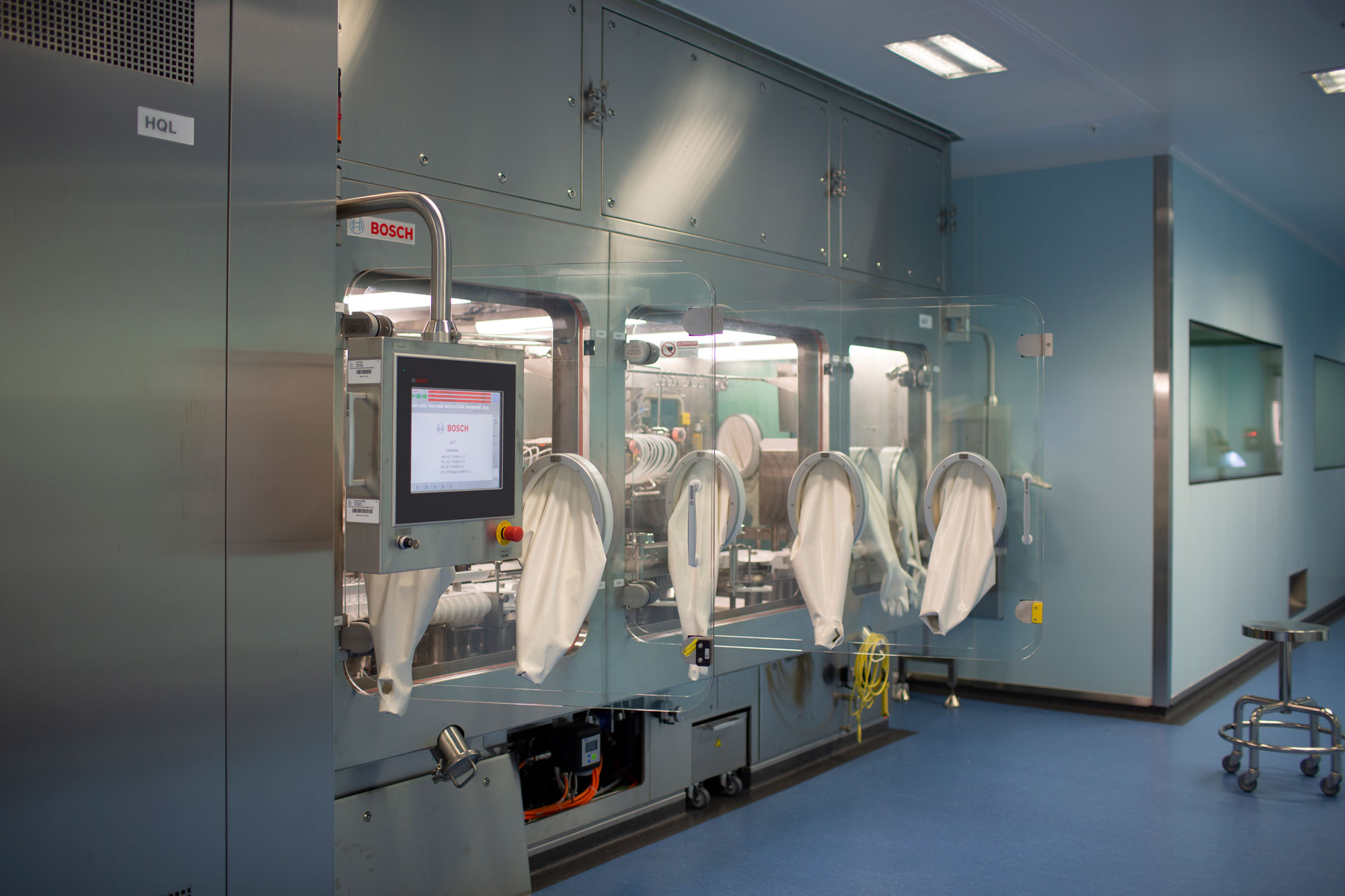Aspen Pharmacare
Global Growth Continues for SA Powerhouse
South Africa’s Aspen Holdings continues to ink international partnerships, utilising state-of-the-art facilities to manufacture critical medicines for local and export markets. The company’s reach and portfolio is unmatched and financial performance is proving the ongoing strategy to be very healthy.
The past five years have been tumultuous for Aspen Pharmacare (Aspen), Africa’s leading pharmaceutical manufacturer. With the pandemic and ensuing economic crisis, the company’s attention was dragged in several directions all at once, while demand for traditional products continued. It required careful management and thorough planning, even when time was precious.
25 years since listing on the JSE, the employer of almost 4000 people in Africa supplies medicines to more than 115 countries through a significant global footprint. In South Africa the company is headquartered in Kwa Zulu-Natal and, through its brands, is well-recognised as a powerhouse in the pharmaceutical industry. The aim today is to deliver value to all stakeholders as a responsible corporate citizen that provides high-quality, affordable medicines globally.
Despite the global healthcare challenges of recent times, Aspen has been pumping out good numbers and performing strongly, taking challenges in its stride and adjusting where necessary. The nimble approach to business has helped the company to achieve strong results for the year ending 30 June 2023.
Revenue grew by 5% with EBITDA up by 1%. Group Chief Executive Stephen Saad was happy with performance and reiterated a focus on growth.
“We are pleased to announce solid results for the year with record revenue and normalised EBITDA delivered in H2 2023,” he said. “Pleasing reported revenue growth was achieved by Commercial Pharmaceuticals and Manufacturing of 6% and 3% respectively, despite the volatile global trading environment.
“We have achieved outstanding progress in our endeavours to secure addition manufacturing volumes for our newly installed expanded sterile production capacities,” he added. “We are tracking well to achieve our previous guidance of related contributions of R2 billion in calendar year 2024, increasing to R4 billion in calendar year 2025.”
He was excited about potential in sterile manufacturing where the company has capacity for expansion. Here, new partnerships have been key in unlocking opportunities.
“These new long-term collaborative opportunities in Manufacturing, together with the Serum agreement, concluded in 2022, will provide substantial support to our medium-term strategy to fill our sterile manufacturing capacity. This in turn presents a potential annual contribution of at least R8 billion per annum.”
NEW PARTNERS
The Serum agreement saw Aspen team with Serum Institute of India to manufacture, market, and distribute Aspen-branded vaccines for Africa. Inoculations against pneumococcal, rotavirus, and poly valent meningococcal, and hexavalent vaccines are now to be made in Africa by Aspen SA Operations with more products to be discussed in the future.
Saad was clear that local manufacturing of pharma products is now an essential part of strategic planning for national health security.
“Africa has learnt from the experience of previous pandemics including HIV and now COVID, that regional capacities are fundamental to solving regional health challenges,” he said. “The agreement concluded with the Serum Institute, and the anticipated grant funding from the Gates Foundation and Coalition for Epidemic Preparedness (CEPI), complement our previously stated commitment to expand sustainable and durable vaccine manufacturing on the continent to reduce Africa’s global vaccine dependency.”
That grant funding was eventually secured in December 2022 when the Bill & Melinda Gates Foundation and CEPI supported Aspen’s local manufacturing ambitions with funding of US$30 million. Using the money to support the rollout of the Serum partnership, the preparedness of Africa to deal with outbreaks of disease, epidemics, and pandemics has been greatly improved.
“We thank both CEPI and the Gates Foundation for their commitment to support regional manufacture for Africa,” stated Saad. “Their commitment, together with our partnership with Serum, is an important first step in ensuring expanded and enduring equitable access to a pipeline of medicines and vaccines manufactured in Africa for Africans… This support will ensure we can continue to invest and expand our capacities, secure in the knowledge of future offtakes.”
HISTORIC COLLABORATORS
In further effort to increase the reach and scope of Aspen across sub-Saharan Africa, focussing particularly on getting medicines to patients who need them, Aspen recently partnered with Lilly (subject to regulatory approval) on a distribution agreement that sees Aspen with rights to sell, promote, and distribute Lilly products throughout South and sub-Saharan Africa.
Saad was understandably excited at the prospect, highlighting the opportunity for yet more coverage where it is sorely needed.
“Aspen has enjoyed a long-standing relationship with Lilly over two decades, and we are delighted to enter into this agreement with them,” he said. “We are honoured that, not only have our commercial and regulatory capabilities been recognised, but also our dedication to ensuring broad access to African patients in need of cutting-edge medication. Lilly has an impressive portfolio coupled with a very strong pipeline, both of which strongly support this objective. We have confidence in our team’s ability to deliver to all stakeholders on the opportunity presented.”
General Manager for Lilly SASSA, Cesar Buendia, said: “The agreement with Aspen offers remarkable potential to reach more patients and expand access to Lilly’s medicines.”
Soon after the Lilly announcement came a landmark agreement with Novo Nordisk which sees Aspen manufacturing human insulin at its Gqeberha facility. Catering for the needs of people with diabetes in Southern Africa – estimated at around five million people and growing – the pair intend to deliver more than 16 million vials in 2024. Around 250 people will work on the line at the state-of-the-art facility in the Eastern Cape, and Saad says that the trust shown in Aspen by international organisations reinforces its position in the market as an industry leader.
“Aspen has a clear objective and focus to capacitate Africa and give quality affordable access to critical medicines from sites based in Africa that are also capable of exporting to global markets. We are proud to be associated and working with Novo Nordisk, a global leader in many areas including diabetic insulins. We hope to build off this initial foundation with Novo Nordisk to further expand access. In addition, this development is important to retaining critical skills and developing new talent on the continent and to diversifying global supply chains to ensure security of supply and improved patient access. To this end, the technical and skills transfer agreement is key and an endorsement of Africa’s role in the regional and global pharmaceutical supply chain. We thank Novo Nordisk for this demonstration of their confidence in Aspen, together we can positively impact the millions of patients most in need.”
GLOBALLY RELEVANT
Working hand-in-hand with other industry leaders from around the world continues to drive Aspen’s brand reputation and quality output, and this strategy is showing no signs of slowing soon. Earlier in the year, Aspen Healthcare FZ penned a deal with Saudi Chemical Company Holding in the Middle East to partner on manufacture and distribution in Saudia Arabia and beyond.
“We are excited to announce our strategic collaboration with Saudi Chemical Company Holding and its subsidiary AJA Pharma. This agreement endorses Aspen’s continuous commitment to align with the Kingdom’s 2030 vision and our drive to provide high quality healthcare products to patients in the Kingdom, the Middle East region and beyond,” said Aspen Healthcare Regional CEO for Middle East, North Africa and Turkey, Daniel Vella Friggieri.
For Africa, and for the vast supply chain and customer base that relies on Aspen to thrive, international expansion is very welcome. Following the opening of the new facility in Gqeberha in 2021, the goal has always been to utilise capacity for the production of medicines that will benefit the continent. That plan continues to rollout.
“We continue to actively explore additional contract manufacturing opportunities as well as further product portfolio enhancements to further drive growth into the future,” concludes ever optimistic Saad.


